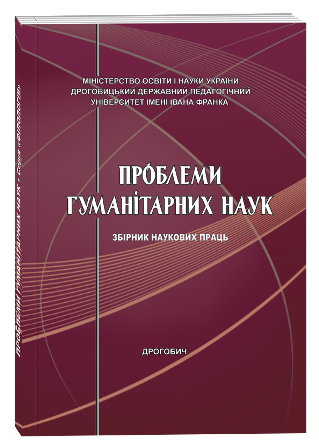GENITIVE METAPHOR AS ONE OF THE IMPORTANT ELEMENTS OF THE WRITER`S SPEECH-MAKING (BASED ON THE POETIC WORKS OF F. POTUSHNYAK)
DOI:
https://doi.org/10.24919/2522-4565.2023.59.5Keywords:
genitive metaphor, linguistic personality, language creation, poetic speech, Fedir Potushnyak, semantics, artistic work.Abstract
Summary. The research is devoted to the study of the genitive metaphor in Fedir Potushnyak’s poetic language. The main features of the genitive metaphor in the poetic texts of the writer are outlined on the basis of the study of a number of scientific works of well-known researchers. It was found that this artistic trope is one of the important linguistic means used to convey the imagery of the statement. It is based on the use of grammatical constructions with words that indicate a certain class affiliation, but they, as part of a genitive metaphor, have such nuances of meaning that go beyond a simple indication of belonging to one or another case. As a result of the research, it is proved that generative metaphors can include implicit or explicit connections between objects, creating additional layers of figurative, associative and symbolic meanings. The influence of genitive metaphors on the linguistic fabric of F. Potushnyak’s artistic works is quite significant. They help to display complex concepts or connections between various phenomena, objects, concepts, etc. Genitive metaphors in F. Potushnyak’s language work reflect the writer's artistic world in a way that is understandable and accessible for perception, as well as disrupting complex thought processes that make it possible to create one's own picture of conclusions. In addition, the genitive metaphor has the ability to reinterpret existing metaphorical constructions, enriching the language system with new possibilities of expressiveness, imagery and aptness of expressing thoughts and feelings. It plays an important role in the formation and development of language, perception and understanding of the surrounding world. The article discusses the results of theoretical research by modern scientists who study the main aspects of genitive metaphor. On the basis of theoretical knowledge, the peculiarities of the genitive metaphor in F. Potushnyak’s speech-making are revealed and its influence on the formation of the writer's individual language style is outlined.
References
Дятчук В., Пустовіт Л. Семантична структура і функціонування лексики української літературної мови. Київ, 1983. С. 132–142.
Єщенко Т. Семантико-стилістичні типи метафор : теоретичний аспект. Донецький вісник Наукового товариства ім. Т. Шевченка. Т. 28. Донецьк, 2010. С. 224–239.
Єщенко Т. Текстово-антропоцентричний вимір метафори українських поетів 1990-х: монографія. Київ, 2018. 352 с.
Потушняк Ф. Мій сад / упоряд. Д. Федака. Ужгород, 2007. 576 с.
Пустовіт Л. Засоби вираження метафори. URL : kulturamovy.univ.kiev.ua/KM/pdfs/Magazine11-3.pdf
Стефурак Р. Ґенітивна метафора – конститутивний елемент художнього тексту Марії Ткачівської (на матеріалі роману «Княгиня Острозька»). Вчені записки ТНУ імені В. І. Вернадського. Серія : Філологія. Журналістика. Київ, 2022. Том 33(72). № 2. Ч. 1. С. 33–38.
Тиха Л. Метафора Михайла Григоріва: лексико-семантичні та граматичні особливості творення. Науковий часопис Національного педагогічного університету імені МП Драгоманова. Серія 10 : Проблеми граматики і лексикології української мови. Київ, 2012. Вип. 9. С. 46–49.
Штонь О. Структурно-семантична специфіка метафор у поетичному дискурсі Петра Сороки. Записки українського мовознавства. Одеса, 2021. Вип. 28. С. 214–220.



